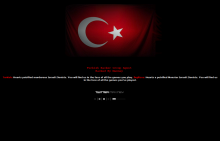Magic marker unlocks hotel rooms
In July this year, we covered a story on how security researcher Cody Brocious managed to unlock the doors of some 4 million hotel rooms using an Arduino microcontroller and some programming magic, affecting Onity’s range of electronic locks. Well, it has taken just two months after this apparent flaw had gone public for other hackers to continue where Brocious left off, improving not only the success rate, but also shrunk down the unlocker into parts that are small enough to fit into your regular dry erase marker.













































































